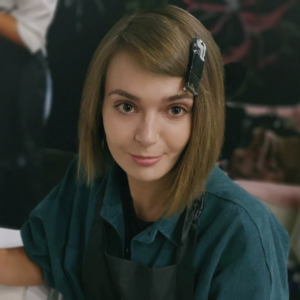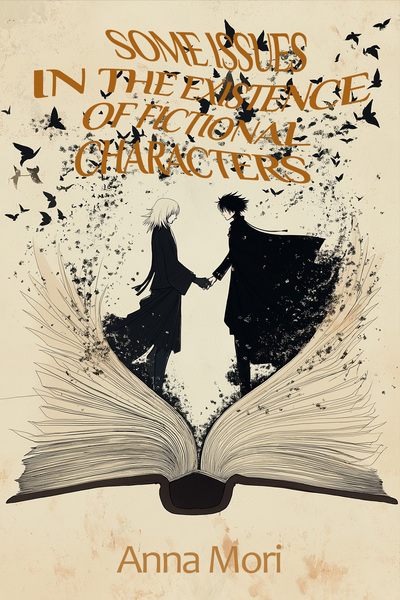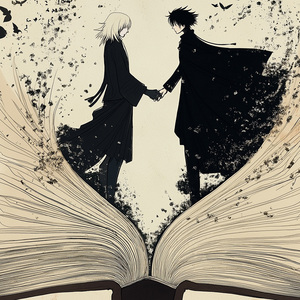But then, didn’t everyone only tell their lives — truly tell their lives — to one person?
— Hanya Yanagihara, A Little Life
He had been thinking for about a week and a half. During that time, he’d had tea with Moriarty, the "rakish malltshipaltshik" Alex, the robotic cat Doraemon, and Captain Nemo. Each time he pulled a character out of a book, they would forget their previous encounter with him. Worse yet, they behaved exactly as they had the first time — like a looping video. In a way, meeting them up close hadn’t made his favorite characters any less appealing, but he had started to understand why L preferred not to meet anyone more than once.
He had also read the book L gave him: Death Note. Makishima disapproved of its liberties with literary genres (gods of death, seriously?), but he had to begrudgingly admit that the battle of wits between L and his sworn enemy — or was "frenemy" more appropriate in their case? — was more intricate and captivating than his own feud with Kogami. The way Kira pretended to be hunting himself down delighted him to his core. But overall, he didn’t like Kira as a character — everything about him felt like a grotesque parody of what Makishima himself had done in his past life.
What was even harder to admit was that he found himself sympathizing with L’s character. The boy was made entirely of extremes and clichés: an almost omnipotent genius who could solve any logical puzzle but was as lonely and naive as a kitten or a puppy — meeting his equal, he immediately decided he had found the first real friend of his life. And yet, he was a character you simply couldn’t help but like. Embarrassingly enough, the story’s ending genuinely moved Makishima: the way L had figured Light out almost immediately but, until the very end, kept searching for a human being inside him, rather than just a self-proclaimed god.
Not that this made the real L any less irritating: his wrinkled clothes, the bird’s nest of hair, the slouch (and the fact that, despite all this, he somehow looked strangely harmonious), his complete disregard for domestic order (Makishima despised dogs, so Nana’s visits as a housekeeper were kept to a strict minimum), his bizarre eating habits (as it turned out, the genius detective refused to eat or prepare anything except for creamy sponge-cake offerings to his divine brain), and, of course, his insufferable air of superiority.
"Why haven’t you sent me back yet?" Makishima asked one day. "I irritate you just as much as you irritate me. You’re so smart — you could’ve found a way to steal my page back and return me to my book by now."
L answered with disarming honesty:
"Because I hope you’ll be useful. I don’t want to send you back yet — I chose you myself. Your mind is, in this situation, more practical than mine."
Makishima was surprised. L might have been otherworldly in many ways, but his intellect had never seemed impractical. When Makishima, who had never been fond of the idea of an afterlife, suggested they determine their physical location by measuring the height of the sun and the position of the stars (he was, in fact, a little proud of himself for coming up with such a rational idea), L gave him a strange look and explained that, in his first weeks here, he had done nothing but conduct such experiments. He had not only built a crude but functional sextant but had also attempted to measure gravitational acceleration, which (he said) varied slightly across different latitudes. All the data pointed to them being somewhere in ordinary, earthly Japan, at approximately the latitude of Tokyo.
L also mentioned he had conducted various tests to understand the rules of this strange place — removing food from kitchen cabinets and observing how soon new supplies would appear (they always reappeared within a few hours, but in a different location, always just out of sight). None of this was practically useful: they were in a damn magical nowhere, stuffed to the ceiling with books, and there was no clear way to make sense of it.
In short, Makishima was convinced that L was certainly no less intelligent than he was (a fact that unsettled him more than he cared to admit), so the compliment caught him off guard.
L elaborated:
"You’re better suited to this literary paradise than I am. Maybe you’ll figure out a way out of here sooner. And besides, you make excellent coffee."
His honesty was infuriating.
"So, I’m more useful to you than all those one-time book friends? I’m flattered," Makishima said acidly. "Am I even better than Nana?"
"Your opposable thumbs make you better suited for certain tasks," L replied, clearly about to steer the conversation back to baking.
The most maddening thing was that L refused to take the bait — he rarely got offended or angry. And Makishima constantly felt the urge to provoke him, to shake him up, to rattle this alien creature.
But truthfully, Makishima was flattered — and he would have liked to live up to L’s trust, if only he could think of something useful.
Two weeks after waking up in the "dark wood," Makishima Shougo had:
- begrudgingly come to terms with the absurd concept of a library-paradise;
- firmly decided that, despite all its flaws, he had no desire to return to his wheat — sorry, hyper-oats (who came up with that idiotic term?) fields at gunpoint under Kogami Shinya’s watchful eye;
- gotten used to conversing with L without constant jabs and arguments (sometimes they even spent time together — playing "hangman," since the house lacked chess or anything similar);
- learned to make genuinely decent coffee.
He also had two ideas, neither of which he was confident in calling good.
Both needed to be discussed with L. Fortunately, he didn’t have to go out of his way to find an excuse — he had just finished reading the book about death gods and their notebooks.
When he found L, he was lying on the floor in one of the rooms, chin propped on his hands, reading a Doraemon manga. Out of all the characters Makishima had pulled from books, L had only taken an interest in this one. He liked the earless robot cat so much that he decided to immerse himself in the original work.
"Here’s your book," Makishima said. "Thanks for lending it to me."
"Did you like it?" L asked without looking up.
"Not really," Makishima lied.
L silently took the book and went back to his children's manga.
Makishima shifted awkwardly from foot to foot.
"I... I saw you pull out Light’s page."
"Yes." L’s voice was usually hard to read — sometimes exaggeratedly expressive, sometimes completely emotionless — but Makishima thought he sounded drier than usual now.
"Did you talk to him?"
"Yes."
"Tell me about it," Makishima pressed.
"There’s nothing to tell. You know how his story ends."
"Did he look lonely? Did he ask for forgiveness? What did you say to him?"
"He looked like a complete psychopath," L said, uncharacteristically serious. "I didn’t say anything. I realized I had absolutely nothing to say. I just felt sick that I lost my life because of my own... as you once put it... childishness."
"I can’t believe my ears! Are you sick or something?" Makishima meant to sound mocking, but it came out more like confusion.
L, ignoring the jab, continued:
"He was truly dangerous, while for me, until the very end, it was just a game. I was supposed to kill him — stab him, shoot him, whatever. I hadn’t gathered enough evidence to prove his guilt, but it wouldn’t have mattered. They probably wouldn’t have even jailed me for it. But I wanted to win fairly so badly that I gambled with my life and... If it had been a game, I would have lost. But instead, I just died, which is far worse. Not to mention all the people who died because of me. I behaved like a child."
This sudden burst of honesty caught Makishima off guard. He felt something unfamiliar — an urge to say something comforting.
"It’s not your fault. I was just thinking," he said, "that our stories sometimes forced us to act..."
"...like fools?"
"...artificially, if the plot or moral demanded it. Remember when you first heard about the death gods? You immediately believed in them, without question."
"Yes, it seems very strange to me now," L agreed. "In the end, of course, I was right — I’m always right..." (Makishima had to fight the urge to roll his eyes), "...and the death gods really did exist in that world of mine. But realistically, shouldn’t my first thought — shouldn’t anyone’s first thought — have been that “death gods” was some kind of code name? A terrorist organization, perhaps?"
"Probably. But let’s be honest, I wasn’t always much smarter myself. I was no better than Thorin tossing away the key to Erebor like a gum wrapper," Makishima said, bitterness and disgust creeping into his voice.
"Who’s Thorin?"
"Eh, never mind. The point is, there’s no use blaming ourselves for mistakes. We were slaves to the narrative. The books that forced us to do all those foolish things — they were like a kind of Sibyl System, but on a universal scale," Makishima added, struck by his own analogy. "Outside of our stories, we became... more lifelike."
"You might be right." L seemed a little brighter. "And that theory is partly confirmed by the fact that you stopped wanting to be killed by Kogami as soon as I pulled you out of your story."
At those words, Makishima remembered why he had come.
"So... about Light..." he said awkwardly. "Have you ever considered not putting him back in the book? Keeping him here — with you?"
"Of course, I considered it. And very quickly realized it was the worst idea imaginable."
"I see," Makishima said, staring at the floor.
L sighed, set aside his copy of Doraemon, and stood up. He suddenly seemed almost the same height as Makishima. His black eyes — dark voids — bored into him.
"You think I don’t see what you’re thinking? I can’t stop you from pulling Kogami Shinya out of his book. But you know as well as I do that he won’t be happy to see you. For one, he’ll never forgive you for everything you did. Like you, he was missing a friend. Like you, he enjoyed your game of cat and mouse. But he’s not like you — he needs to believe he’s doing the right thing."
"Since when did you become a psychologist?" Makishima sneered, though he knew L was absolutely right. "Let’s say I accept that. And secondly?"
"Secondly, I just don’t like your Kogami," L announced with shameless bluntness. "He’s too..."
"...rational? " Makishima guessed.
"...boring," L said mercilessly.
Makishima felt a surge of irritation. A minute ago, he had wanted to discuss his second idea with L — he had pictured the two of them reasoning it out together, two intelligent minds weighing the pros and cons. But now, he was certain: it was impossible to have a serious conversation with this infuriating man.
So he decided not to ask for his opinion.
Keeping his tone as calm as he could manage, Makishima said:
"By the way, there was a page missing from the Death Note book — yours."
"Of course. I keep it with me. Just like you keep yours now."
"I want to read that scene," Makishima stated.
It wasn’t entirely a lie — he was curious about the details of L’s death, even if he already had a general idea. But that wasn’t why he needed the page.
L looked at him with an expression Makishima couldn’t decipher. There was no suspicion, no fear, no challenge.
Then he pulled out a sheet of printed text and handed it over. It looked almost identical to the one folded in Makishima’s own pocket, stained with traces of food in exactly the same way.
"You mean to tell me you fell for the same basic trick twice?" Makishima asked in disbelief.
"I trust you. I don’t think you’ll do anything bad with my page. And besides, there’s no reason for you to kill me — without me, things would get far too dull."
That made Makishima even angrier.
"Stop pretending you know everything about me," he snapped, yanking the page from L’s hand. "That was a stupid thing to do. I could do whatever I want with you now."
L tilted his head to the side like a raven, eyes glinting with curiosity.
"And what do you want?"
The damn idiot wasn’t afraid of him at all.
"You asked me to come up with something. And I did. What if I put your page in someone else’s book? How’s that for an idea?" Makishima said, his voice laced with amusement.
"Hmm," L murmured. "In theory, I might end up in another story — perhaps even experience it as a physical transition to a new world. That could be interesting. But before experimenting on me, wouldn’t it be more logical to first—"
He reached for the page, but Makishima quickly stepped back, raising his hand out of reach.
"Already regretting giving it to me?" he taunted.
L frowned. His posture shifted, his gaze sharpening — Makishima suddenly recalled that, according to the Death Note, this guy was actually pretty good in a fight. He wasn’t in the mood to test that theory, so he grabbed the first book he saw from the shelf. The cover featured elves and swords.
"You don’t mind fantasy, do you? Lovely genre."
"Don’t you—" L began, but he didn’t have time to finish.
Makishima shoved the pages into the book.
Both pages — his and L’s — together.
At first, he had planned to be an observer in this experiment. But in that last moment, he realized something — something obvious.
He couldn’t let L be the first to know what it felt like.
To escape the prison of their stories.
To fall into a world where neither of them was ever meant to exist.











Comments (0)
See all